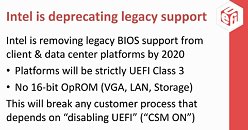Sunday, November 19th 2017

Intel to Remove Legacy BIOS Support from Motherboard UEFI in 2020
Intel is guiding its motherboard partners to remove legacy BIOS support from their UEFI firmware by 2020. The company's client- and enterprise-platforms that come out in 2020 will lack CSM (compatibility support module), a component which lets UEFI-unaware operating systems and bootable devices run on newer machines with UEFI. Devices featuring this CSM-devoid runtime will be graded "UEFI Class 3," as the runtime only exposes UEFI or UEFI PI interfaces.
This practically marks the end of 32-bit operating systems on the newer machines, as 32-bit Windows and desktop Linux distributions require CSM. You'll still be able to use 32-bit software running on 64-bit Windows through WoW64 translation layers. The lack of CSM will also affect devices with 16-bit OpROM, such as older network adapters, and older RAID HBAs. You'll have to depend on OS-based programs to configure those devices. Newer versions of Windows Secure Boot will require UEFI Class 3 devices to function. This also affects booting with your main display plugged into graphics cards older than 4 years (launched roughly before 2013), which lack UEFI-ready video BIOS.
Source:
Tweakers.net
This practically marks the end of 32-bit operating systems on the newer machines, as 32-bit Windows and desktop Linux distributions require CSM. You'll still be able to use 32-bit software running on 64-bit Windows through WoW64 translation layers. The lack of CSM will also affect devices with 16-bit OpROM, such as older network adapters, and older RAID HBAs. You'll have to depend on OS-based programs to configure those devices. Newer versions of Windows Secure Boot will require UEFI Class 3 devices to function. This also affects booting with your main display plugged into graphics cards older than 4 years (launched roughly before 2013), which lack UEFI-ready video BIOS.



38 Comments on Intel to Remove Legacy BIOS Support from Motherboard UEFI in 2020
Is it progress or just even more control for Intel?
Its time to put the 32 bit OS to the grave and move on. We have had 64 bit CPU for more than a decade now and most newer software runs on 64 bit systems.
Are you sure you need CSM for a 32 bit UEFI installation? There are a lot of devices (most of them tablets) running 32 bits Windows on an UEFI setup.
In combination with Intel it is just plain and simple unstable and has endless security issues. The rest doesn't need to be mentioned after those 2.
I wasted years of work that I didn't had to waste to get those CSM Modules running stable because UEFI wasn't able to do it on Intel Embedded Platforms.
So in average from 5 companies with 1 Intel Embedded Platform I get 1 working at least to a level that is comparable to 2000ish System Stability and possibly after 2-3 years a 2nd one.
Intel built EFI/UEFI from scratch, then founded the consortium that oversees it. Really, saying adding Intel to UEFI ruins it doesn't make sense. On the other hand, I can name and shame quite a few non-Intel OEMs for having absolute trash UEFI implementations.
Embedded platform also suffers from that old chestnut too: embedded platforms suck.
Finally, any particular reason why you didn't try a pure UEFI environment? I've had highly mixed experiences when relying on CSMs, but generally good times with pure UEFI.Windows 7 happily runs with UEFI, though the iso is broken when used with a USB installer (works fine from a DVD/virtual DVD), so you have to fix it before you can install it in UEFI mode from USB.
But anyway, it's no biggie. Windows 7 is EOL in 2020, and everything after that does not need CSM: even FreeBSD, Linux and various Android x86 distros.1) Make sure you have a GPT partition table on your USB stick
2) Create a UEFI installation disk for Win7
3) Enable CSM in your UEFI settings (may be also called "Windows 7 boot mode" or something along these lines).
"But anyway, it's no biggie. Windows 7 is EOL in 2020," Microsoft's wet dream, as I said. They can't wait for Windows 10 to be the only "reasonable" choice, so that they can start dicking people with their windows store.
I do know that one of the reasons is that most companies got rid of their skilled people with the change to UEFI if on purpose or not but if the new ones aren't up to the task then there is only one answer.
To the rest were you truly involved in any System development so you can understand my words? :
Can't tell anything that is under NDA but with standard Bios it was a task of 1-2 weeks with board/Bios Devs.
If still needed sending the stuff in to get it analyzed from Intel&Co with max 2 months till we had a solution.
System complexity was back then comparable. Eg. the Limitations of Interrupts&Co just needed skilled people working and the UEFI Version solves it different but still has many identical Limitations doesn't matter how much VT you integrate the hardware defines them.
ME & Co are not relevant as they are limited to only needed working parts.
Since Intel has only priority on UEFI we found many Issues that are not even solvable with UEFI without CSM usage.
So we needed to switch to CSM, sometimes even switch to a different OS and spending at least every time half a year.
That is definitely no fun and what I am speaking about and everybody else involved in similar designs also questions why the **** do we even need that?
Just as a reminder, I'm speaking of stable systems. Not RT and not your gaming PC.
Microsoft has killed my work laptop 3 times these last two weeks by installing driver "updates" I didn't ask for, and have no way of stopping. It had to be rolled back every time, taking 1-2 hours of my work time to do so. I will clean 10 of my family's computers if I have to, but I am not giving Microsoft that control, even if it means completely eliminating windows from my life.
The absence of one is the reason why PlayMarket, AppStore and Windows marketplace degraded so much.
I wouldn't mind having a functional software distribution platform with curated Apps, adequate QC by alive people, and proper measures against rating abuse and app-spam.
Kind of what Sony had in mind for Tizen, but settled on yet another conventional crapware dunghole. Or like early Apple AppStore...
I have said it before and I'll say it again... the next generation of operating systems with app stores isn't for us tech people, it's for people who have no damn clue what they are doing and manage to get their systems infected from here to next Tuesday. Those are the people who need all the hand holding that they can get and a whole lot more. Face it people, us tech people are in the minority of people who use these systems; the majority need all the help that they can get.
How many times have you encountered a person and you want to rip their computer away and hand them an iPad? I have on multiple occasions.
I have also programmed an actual boot system for android. And have created a custom u-boot version to enable secure boot on a platform that doesn't support secure boot by itself.
But yeah, lets go with I don't understand windows 7 boot system.In UEFI mode? Not BIOS emulation on UEFI enabled machine?
EDIT: Wait, class 3+ will FORCE Secure Boot?!
The graphics card thing probably isn't an common issue though; I don't see people shoving in 7+ year old graphics card into a new mobo unless it's an old card used for testing/stopgap.Fixed that for you.
Microsoft still has a raging hard-on for getting people off Windows XP after almost a decade. You can still shove XP on newer mobos though without some newer chipset functionality just like Vista and 7 right now. Getting people off Windows 7 probably isn't far off though. But this isn't it.
Out of curiosity, anyone know if XP64 needs CSM? It's not exactly XP32 but also not exactly what's commonly thought of as a "64-bit OS".Apple's recent success comes from catering to the unwashed masses, and there are a lot more of them than us. Microsoft is certainly taking a cue from that with Windows 10. Apple's dumbing-down, hand-holding, and overpriced hardware ("Apple Tax") is absurd to us. But it appeals to people who lack the brain cells, can't be bothered, or would rather be doing other stuff than securing their systems. A little knowledge goes a long way, but as the old saying goes: "You can lead a horse to water, but you can't make him drink it". If people ever needed something to continually restore their lack of faith in humanity, this would be it.